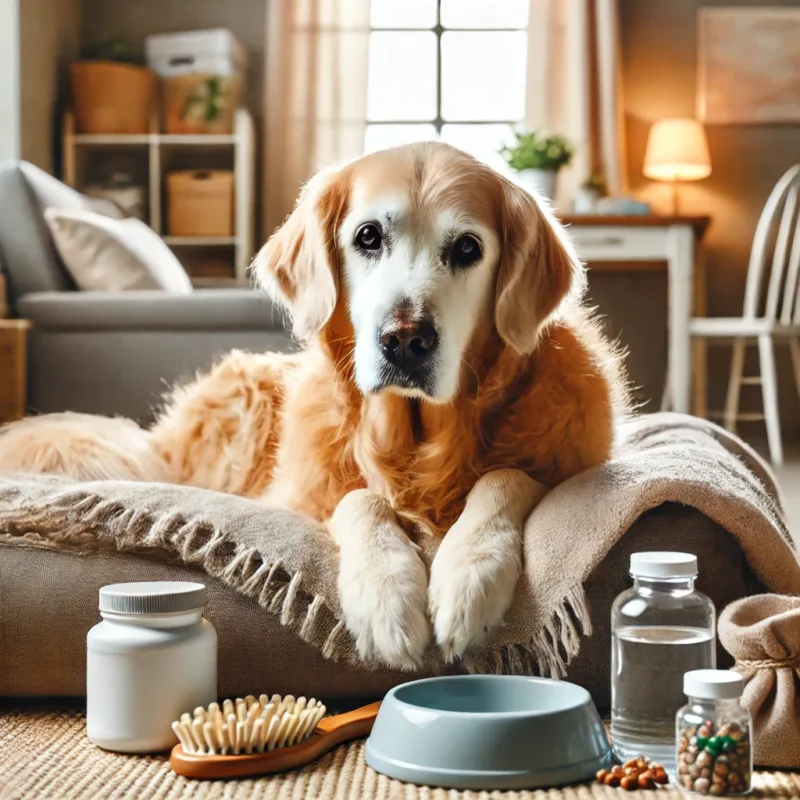Unlocking the Secrets of Senior Dog Care: What Every Pet Parent Needs to Know
Are you worried about your aging furry friend? As our canine companions grow older, their healthcare needs change, and it’s crucial for pet parents to stay informed. Recent research has shed light on the gaps in understanding between dog owners and veterinary professionals when it comes to senior dog care. Let’s dive into what you need to know to keep your aging dog happy and healthy.
The Silent Signs of Aging: More Than Just Gray Hairs
We all know that dogs, like humans, slow down as they age. But did you know that what you might consider normal aging could actually be a sign of an underlying health issue? Here are some common symptoms that pet owners often overlook:
- Slowing down on walks (57% of owners consider this normal aging)
- Increased dental tartar (53% think it’s just part of getting older)
- Stiffness when getting up (50% attribute this to age alone)
These seemingly innocuous changes could be indicators of more serious health problems. As a responsible pet parent, it’s essential to be aware of these subtle signs and not dismiss them as mere side effects of aging.
Vet Visits: How Often is Enough?
When it comes to veterinary care for senior dogs, there’s a significant discrepancy between what owners think and what vets recommend. Most dog owners believe an annual check-up is sufficient for a healthy senior dog. However, veterinary professionals strongly advise bi-annual visits for older pups.
Even more concerning, 14% of owners only take their dogs to the vet when they’re visibly sick. This approach is almost universally discouraged by vets, as it can lead to missed opportunities for early detection and treatment of age-related conditions.
The Vaccination Debate: Are Senior Dogs Off the Hook?
Here’s a surprising statistic: while 92% of veterinary professionals believe senior dogs should receive yearly vaccinations, 28% of owners’ dogs hadn’t been vaccinated in the previous year. Some owners even believe that older dogs don’t need vaccinations at all.
This misconception could put your aging furry friend at risk. Vaccinations remain crucial throughout a dog’s life, helping to protect against potentially serious diseases that can be even more dangerous for older, more vulnerable pets.
When to Worry: Recognizing Urgent Health Issues
As pet parents, we often struggle to determine when a symptom warrants immediate veterinary attention. Here’s a quick guide to help you make that call:
- Dental issues: While they might seem minor, dental problems can lead to serious health complications if left untreated.
- Musculoskeletal problems: Limping or difficulty moving could indicate arthritis or other joint issues that can significantly impact your dog’s quality of life.
- Changes in appetite or water consumption: These could be signs of various health issues, from dental pain to kidney problems.
Remember, when in doubt, it’s always better to consult with your vet. They can provide professional guidance tailored to your dog’s specific needs.
Bridging the Communication Gap: The BSAVA PetSavers Ageing Canine Toolkit
To address the disconnect between pet owners and veterinary professionals, the British Small Animal Veterinary Association (BSAVA) has developed the PetSavers Ageing Canine Toolkit (ACT). This invaluable resource includes a checklist to help identify commonly overlooked clinical signs before a veterinary appointment.
By using this toolkit, you can:
- Better understand your senior dog’s health needs
- Communicate more effectively with your vet
- Catch potential health issues early
Preventive Care: The Key to a Happy, Healthy Senior Dog
Research shows that older dogs are more likely to suffer from health issues and require medication. However, they’re less likely to receive preventive care or be enrolled in healthcare plans. This paradox highlights the importance of proactive healthcare for our aging canine companions.
By prioritizing preventive care, you can:
- Improve your dog’s overall health and wellbeing
- Catch potential health issues before they become serious
- Potentially reduce long-term healthcare costs
Remember, your aging dog relies on you to make informed decisions about their health. By staying vigilant, communicating openly with your vet, and prioritizing preventive care, you can help ensure your furry friend enjoys their golden years to the fullest.
FAQs About Senior Dog Care
Q: At what age is a dog considered senior?
A: Generally, dogs are considered senior when they reach 7-10 years old, depending on their breed and size. Larger breeds tend to age faster than smaller breeds.
Q: How can I make my senior dog more comfortable at home?
A: Consider providing orthopedic bedding, using ramps or steps for easier access to furniture, and keeping their food and water bowls easily accessible.
Q: Are there specific diets for senior dogs?
A: Yes, many pet food brands offer specialized diets for senior dogs that cater to their changing nutritional needs. Consult with your vet for recommendations tailored to your dog’s specific health requirements.
As we’ve explored, understanding and addressing the healthcare needs of aging dogs is crucial for their wellbeing. By staying informed and proactive, you can help ensure your senior dog enjoys a happy, healthy life well into their golden years.

